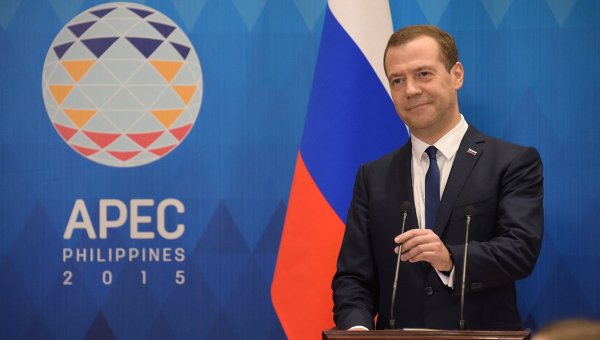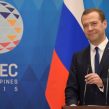
Another Opportunity Lost: Russia and Southeast Asia
Publication: Eurasia Daily Monitor Volume: 12 Issue: 218
By:

Southeast Asia is not generally seen as an area of Russia’s core vital interests. But given the priority of Moscow’s Asian pivot, it is an important area both in terms of strategic issues and economic opportunity. Nevertheless it seems that once again Moscow has missed an opportunity to upgrade its overall regional profile here. Once again President Vladimir Putin declined to attend the Asia-Pacific Economic Community (APEC) and East Asia summits, in Manila (November 18–19) and Kuala Lumpur (November 21–22), respectively. Instead, he sent Prime Minister Dmitry Medvedev who, it seems, has come to possess the Southeast Asian “file” in Russian diplomacy (TASS, Government.ru, November 12). Putin’s failure appears to reflect Russian officialdom’s continuing low regard—rhetoric to the contrary notwithstanding—for Southeast Asia and even the wider Asian-Pacific region as a whole (Carnegie.ru, June 1).
Medvedev’s remarks delivered on his visits to the two aforementioned summits and then Cambodia also seemed to suggest Moscow’s lack of ideas as to how to advance Russian influence and standing in Southeast Asia. Once again, Medvedev reiterated that two-thirds of the Russian Federation’s territory is located in Asia and that Russia supposedly is “inescapably linked to this region” (President.gov.ph, November 19). Yet, his words grossly overstated the reality: Russian trade with Southeast Asia is still minuscule (see below) and Russia’s economy remains in a precarious condition. As could be expected, the Russian prime minister echoed the government line that despite the problems the economy faces—namely, falling oil prices, a falling ruble and sanctions—Russia remains quite stable and therefore merits serious consideration as a place for Southeast Asia to invest (RT, November 18). However, it is unlikely that such bland statements reassured or convinced many investors
During his presidency (2008–2012), Medvedev was the originator of Moscow’s “pivot” to Asia. Therefore, the Kremlin’s choice to send him on last month’s Southeast Asian tour was probably meant to highlight Russia’s ambitions to diversify the country’s Asian connections. Yet, Russian scholars concede that there is a lot of skepticism, both domestically and internationally, as to whether this pivot actually extends beyond China. Indeed, Russia’s engagement with the Association for South East Asian Nations (ASEAN) is so limited that both parties amount to less than 2 percent of each other’s external trade structure and investment (Deutsche Welle, December 1). Inadvertently illustrating Russia’s marginalization from ongoing regional economic dynamics, Medvedev criticized the Trans-Pacific Partnership (TPP) for being negotiated behind closed doors. Russia is notably not a member to this 12-party trade agreement, which is backed by the United States (Government.ru, November 19). At the same time, neither he nor any other prominent Russian policymaker has publicly commented on the parallel development of the ASEAN Economic Community, even as Moscow solicits investment and trade form ASEAN’s members.
Moscow’s economic exclusion from the ASEAN and Southeast Asia owes much to Russia’s own neglect of opportunities there as well as its long-running failure to undertake the reforms necessary to be economically and thus strategically competitive in Asia. Thus, while Medvedev announced Moscow’s willingness to supply Cambodia with energy technologies and equipment and signed several cooperation agreements, meaningful cooperation cannot go much farther due as much to Russia’s deficiencies as to Cambodia’s (Sputnik News, November 24).
Yet, Prime Minister Medvedev also demonstrated that Moscow has little or nothing to contribute to the region in the security sphere. When queried about the critical issue of China’s encroachments upon the South China Sea, Medvedev essentially punted. He stated that the issue should be resolved through negotiations, a statement that is meaningless since China will not negotiate over these issues and has made that abundantly clear (Japanfocus.org, October 26; see EDM, April 29). He also said it is desirable to proceed on the basis of the United Nations Convention on the Law of the Sea (UNCLOS) while overlooking the fact that China has repeatedly violated that international agreement. Finally, he declared that Russia has no preferences on this issue regarding any particular party’s position. So while the Philippines have the right to take this issue to court, Russia will not become involved at all (Government.ru, November 19).
In other words, Moscow will say nothing and do anything that can be construed as being critical of China. Indeed, it is even conducting exercises next year in the South China Sea with China and Brunei (Sputnik News, May 30). Whatever Moscow says, it will most likely be construed in the region as an implicit recognition of China’s stance in those waters. Essentially, Moscow has told ASEAN that Russia has recused itself from the most vital issue to its members—tensions in the South China Sea. Consequently, it is hardly surprising that few Southeast Asian countries believe Russia really is a major player upon whom they can rely for a disinterested and objective approach or as a valuable interlocutor, if not mediator, in their confrontations with China. It appears, therefore, that Medvedev really has nothing to offer Southeast Asia except the usual unconvincing Russian bromides, which increasingly fall flat and evoke no response from his audiences. Russia may not want to be forced into choosing between its major partners, China and Vietnam (Russia-direct.org, January 23). But the more it falls into dependence on China and fails to invigorate its economy or reform it, that choice will increasingly be made for it, and for Vietnam. Meanwhile, the other members of ASEAN will not accept being left in the lurch by a Russia that demonstrates decreasing relevance and capability in Southeast Asia.




